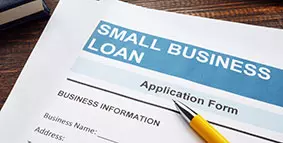

Get the one that is right for you
New small business owners typically need to borrow money to buy equipment and supplies, pay employees, and otherwise finance their operations. To help you get a loan that fits your needs, these are some basics to consider on your road to success.
Improve your chances of getting a good loan
Start by having a well-prepared business plan. Showing proposed earnings can reassure lenders that a loan will be repaid.
Maintain a good business and personal credit history
Manage your business and personal credit well to increase the likelihood of being approved for a loan when you need it. A good credit score and history suggests to banks and other financial institutions that you have handled your finances well, and it can help you qualify for better loan terms, which helps save you money. For more information on credit reports and credit scores, visit FDIC Consumer News: Credit Reports and Credit Scores.
Monitor your credit report for accuracy
An accurate credit history is important to building and maintaining good credit. Many criteria go into a credit score, including your payment history and the number and type of loans that you have. Monitoring your credit report can help you ensure that the information is accurate, and if not, then you can take steps to correct it in a timely manner. Monitoring your credit report will also help you guard against identity theft, scams, and avoid unexpected credit issues when you go to apply for a loan. For more information on monitoring your credit and scams targeting small businesses, visit FDIC Consumer News: Your Small Business Deserves Big Support.
Comparison shop for government-guaranteed loans
The U.S. Small Business Administration (SBA) has several programs to help finance small business loans. Many SBA loan programs combine business coaching and technical assistance, as well as access to financing, on more flexible terms. One example is the 7 (a) Loan Program, SBA’s most widely-used loan guarantee program. The specific terms of SBA 7(a) loans are negotiated between the borrower and the participating lender, subject to the requirements of the SBA. According to the SBA, the 7(a) loan is often the best option when real estate is part of a business purchase, but it can also be used for: short- and long-term working capital, refinance current business debt, or to purchase furniture, fixtures, and supplies.
Such loans may have minimum dollar amounts, however, so if you need a loan for less than the lender’s minimum amount, ask your bank for a referral to a lender participating in the SBA Microloan Program. According to the SBA, its Microloan program provides small businesses with small, short-term loans — up to $50,000 — for working capital, or to buy inventory, supplies, furniture, fixtures, machinery, and equipment. Such loans are only available from specially designated intermediary lenders, which are non-profit organizations with experience in lending and technical assistance.
Understand the different types of financing
For most small businesses, operations are financed in three key ways (not including investments or loans from family and friends):
- Personal lines of credit are commonly used, such as credit cards (either an owner’s personal card or a business card guaranteed by the owner) or home equity lines of credit (the small business owner’s home serves as the collateral), but there are risks.
- Business lines of credit provide a convenient way for a business to borrow up to a certain dollar amount and repay it in installments with interest over several years. Business owners should consider how and when the business will generate revenue to repay the loan. Short-term financing tools should not finance costly, long-term investments.
- Business term loans, which establish a set dollar amount repaid in installments over three or more years, are recommended for purposes such as financing the purchase of equipment or a vehicle. Often, the asset that is purchased secures these loans. Term loans mean predictable payments for businesses, but unlike lines of credit, a business may have to make a new application if it needs to borrow additional funds.
Protect your personal accounts
Keeping your business accounts separate from your personal accounts has some benefits.
- All deposits owned by a corporation, partnership, or unincorporated association at the same bank are added together and insured up to $250,000, separately from the personal accounts of the owners or members.
- Business banking offers limited personal liability protection by keeping your business funds separate from your personal funds.
- The separation makes it safe and easy to authorize employees to handle day-to-day business banking tasks without being involved in your personal finances.
- The Internal Revenue Service also recommends that you have a business checking account that is separate from your personal accounts because doing so can make recordkeeping for tax time easier. It may even be essential, depending on your corporate structure.
- Business accounts can help establish convenient ways for customers to pay with credit cards or use checks made out to your business.
The need for separate accounts generally increases as a business grows or becomes complex. Just remember, consumer protection rules do not apply to transactions conducted by a business, whether it be a deposit account or loan.
Small business owners need to know what financing is available and what works best for them to be able to grow their businesses, and have the right resources to make their business a success.
Additional resources
FDIC Consumer News: Business Cents
FDIC Money Smart for Small Business
Federal Trade Commission: Getting Business Credit
Consumer Financial Protection Bureau: Additional Resources for Small Business Owners
IRS Small Business and Self-Employed Tax Center9
U.S. Department of Agriculture’s (USDA) One RD Guarantee loan program
For more consumer resources, visit FDIC.gov, or go to the FDIC Knowledge Center. You can also call the FDIC toll-free at 1-877-ASK-FDIC (1-877-275-3342). Please send your story ideas or comments to ConsumerNews@fdic.gov. You can subscribe to this and other free FDIC publications to keep informed!
